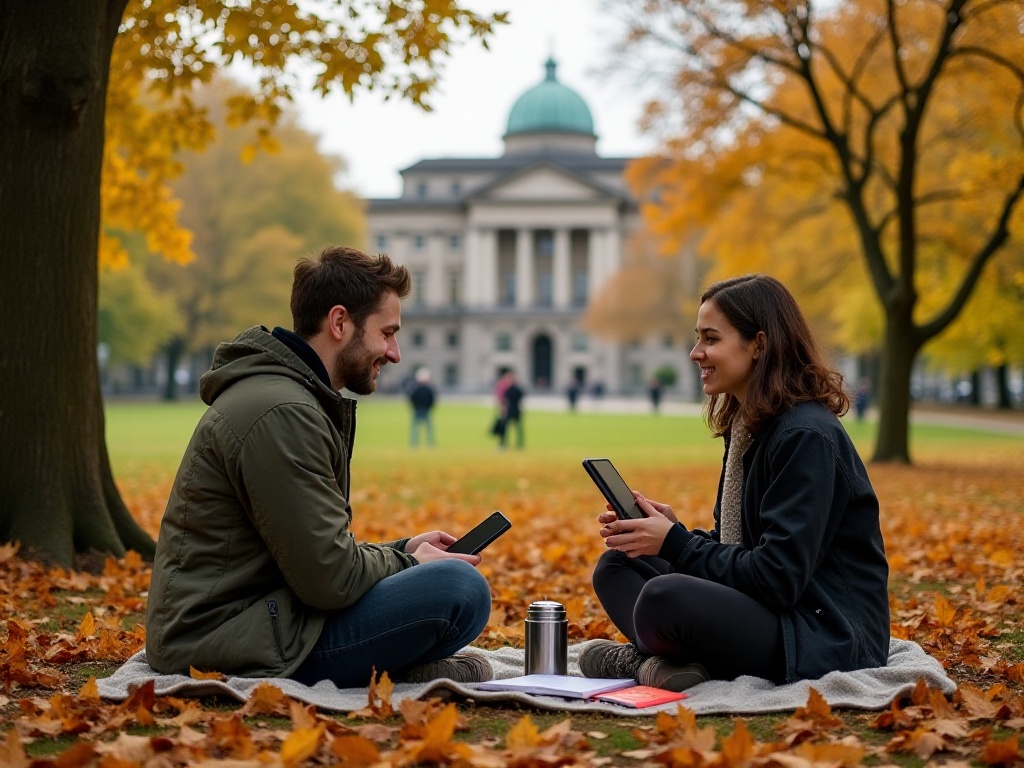
Opening Chat
Learning Japanese is really hard! Even after memorizing so many words and watching lots of anime, I was still lost in Japan. I remember my first time in Japan, I could barely stutter through ordering ramen, and when the staff asked if I wanted a soft-boiled egg, I didn't understand at all. Although I passed N2, talking with Japanese people always felt off somehow, like there was a frosted glass between us. Until last year's trip around Japan, which completely changed my language learning approach and helped me find the key to improving my Japanese.
Unexpected Discovery
This time last year, I was preparing for a spontaneous trip around Japan. At that time, although I was a "paper Japanese expert," I was actually quite timid when it came to real communication. You know that feeling? When you have so much you want to say in your head, but you just can't get it out, and when you do say something, it feels really awkward. Later I realized this might be what they call "mute Japanese."
Every time I watched natural, flowing conversations in Japanese dramas, I wondered: why can't I speak like that? Until one day, while watching a Japanese countryside travel video on Bilibili, I had a sudden realization - why not try immersing myself in Japanese people's daily lives?

Breaking the Ice
I took action immediately! My first stop was a place many people might not have visited - Tottori Prefecture. Why choose here? Honestly, it was initially because the flights were cheap (laughs). But later I found out this choice was absolutely perfect!
Imagine, in a restaurant in Tokyo's Ginza, if you speak broken Japanese, the staff might switch to English right away. But in a place like Tottori, local people's eyes light up when they hear you speaking Japanese!
On the first night, I walked into a small izakaya decorated with lanterns. When I opened the door, my heart was racing. The menu was full of handwritten kanji, all crooked and confusing. I gathered my courage to ask the owner what these dishes were, and found out she was super friendly!
"This is our local specialty, matsuba crab, and it's the best season for it right now!" the owner explained while gesturing, "Would you like to try our special crab miso soup?"
Just like that, I not only enjoyed an incredibly delicious dinner but also learned many food-related vocabulary words. Words like matsuba crab (松葉ガニ), crab miso (カニみそ), and charcoal-grilled (炭火焼き) now feel particularly familiar when I say them.

Turning Point
On my third day in Tottori, while browsing an antique market, I met an ikebana teacher. Seeing my interest in her flower arrangements, she invited me to experience her classroom. Honestly, I couldn't believe I'd randomly gotten an opportunity to learn about traditional Japanese culture!
The ikebana classroom was full of local housewives, ranging from their 30s to 60s. I was really nervous at first, worried I wouldn't understand what they were saying. But these aunties were so adorable! They spoke very gently and would deliberately slow down their speech.
What touched me more was that after learning I was a traveler from China, they immediately treated me like a "daughter." They invariably invited me to their Wednesday afternoon tea parties and often brought me homemade snacks.
At these tea parties, I learned many little tricks used in daily Japanese conversations. For example, Japanese housewives like to use "~かしら" to express questions, which sounds very elegant; when gossiping, they use "~らしいよ," which sounds like an insider's perspective. These are things you can't learn from textbooks!
Practical Insights
This month-long journey made me understand that to truly improve language skills, you need to immerse yourself in local life.
In Kyoto, I specifically chose a guest house converted from an old machiya. The landlady was in her 60s and would wake up at 5 AM every morning to prepare breakfast. I volunteered to help and ended up learning many kitchen expressions. For instance, "切り方が雑ですね" (the cutting is too rough) and "もう少し薄く切ってください" (please cut it thinner) are very practical phrases.
Once when I cut potato slices too thick, the landlady laughed and said: "あら、これじゃ肉じゃがになっちゃうわね" (Oh my, at this rate it's going to become nikujaga). This kind of humorous expression helped me appreciate the interesting aspects of Japanese.
In Nagoya, I found a photography enthusiast group on Instagram. When I first joined their activities, I was completely lost when they discussed technical terms like composition and lighting. But everyone was very accommodating and would explain using simple words. Gradually, I learned not only photography terms but also how to discuss photo concepts and feelings in Japanese.
The most magical experience was in Sapporo. One evening at a FamilyMart convenience store, I casually asked the clerk which oden items were good. It turned out this part-time college student was a foodie who recommended many authentic Sapporo restaurants to me. Later we went to try Sapporo's famous soup curry together, and he taught me many Hokkaido dialect words, like "なまら" (super) and "しょっぱい" (tired).

Unexpected Gains
This immersive language learning brought me more than just improved language ability. Through participating in various cultural experiences, my understanding of Japan became more three-dimensional.
For example, during a tea ceremony experience in Kanazawa, the teacher not only taught us how to properly drink matcha but also explained in detail the meaning of "ichigo ichie." It turns out this isn't just a simple phrase, but a life attitude: cherishing every encounter because such moments might never come again.
In Fukuoka, I participated in a udon-making workshop. While teaching us how to knead the dough, the noodle master said: "力加減が難しいでしょう?コツは、生地と対話することです。" (Controlling the strength is difficult, right? The secret is to dialogue with the dough.) This personified expression helped me appreciate the delicacy of Japanese expression.

Data Support
This month's experience gave me concrete progress. I specifically recorded my learning situation: my vocabulary notebook expanded from 2000 words to nearly 3000, and most of them are practical conversational expressions.
The most obvious change was in listening comprehension. Previously, I needed subtitles to watch Japanese dramas, but now I can understand over 80% of the content. I've made particular progress in understanding Japanese people's tones and intonations.
Spoken expression has also become more natural. Before, I would always think about whether the grammar was correct, but now I can naturally say mood words like "そうそう" and "なるほど." Even my intonation when saying "えぇ~" has become very authentic.

Concluding Advice
If you also want to improve your language skills through travel, my advice is: don't worry too much about speaking correctly. Japanese people actually really understand how difficult it is to learn Japanese, and as long as you're willing to speak, they will patiently listen to you.
I remember in Kumamoto, I made a grammatical mistake, saying "食べてみたい見たい" instead of "食べてみたい." The Japanese grandfather nearby didn't laugh at me but said: "若者らしい言い方だね" (That sounds like how young people talk). Since then, I've never been afraid of making mistakes.
Finally, I want to say that there really are no shortcuts in language learning, but choosing the right learning method is important. Rather than spending time memorizing textbooks, try immersing yourself in a real language environment. Trust me, when you truly integrate into Japanese people's lives, your Japanese level will definitely improve dramatically!
So here's a question: Have you had experience learning a language while traveling abroad? Welcome to share your story in the comments.
Next
Learning Languages in Foreign Lands: An Immersive Experience Shared by a Travel Blogger
Explore the dynamic relationship between travel and language learning, examining how immersion enhances language skills and how linguistic abilities deepen travel experiences through cultural engagement and authentic interactions
One Person's Language Journey: Measuring the World with Footsteps, Making Travel the Best Language Classroom
Explore effective methods and benefits of learning languages through travel, combining immersive strategies with practical approaches, supported by digital tools and structured resources for enhanced language acquisition and personal growth
One Person's Language Learning Journey: My 90-Day Immersion Experience in a Rural Japanese Town
Explore how travel facilitates language learning through immersive environments, covering natural and structured learning methods, along with guidance on choosing suitable language programs and courses to enhance language skills while traveling
Next

Learning Languages in Foreign Lands: An Immersive Experience Shared by a Travel Blogger
Explore the dynamic relationship between travel and language learning, examining how immersion enhances language skills and how linguistic abilities deepen travel experiences through cultural engagement and authentic interactions

One Person's Language Journey: Measuring the World with Footsteps, Making Travel the Best Language Classroom
Explore effective methods and benefits of learning languages through travel, combining immersive strategies with practical approaches, supported by digital tools and structured resources for enhanced language acquisition and personal growth

One Person's Language Learning Journey: My 90-Day Immersion Experience in a Rural Japanese Town
Explore how travel facilitates language learning through immersive environments, covering natural and structured learning methods, along with guidance on choosing suitable language programs and courses to enhance language skills while traveling



